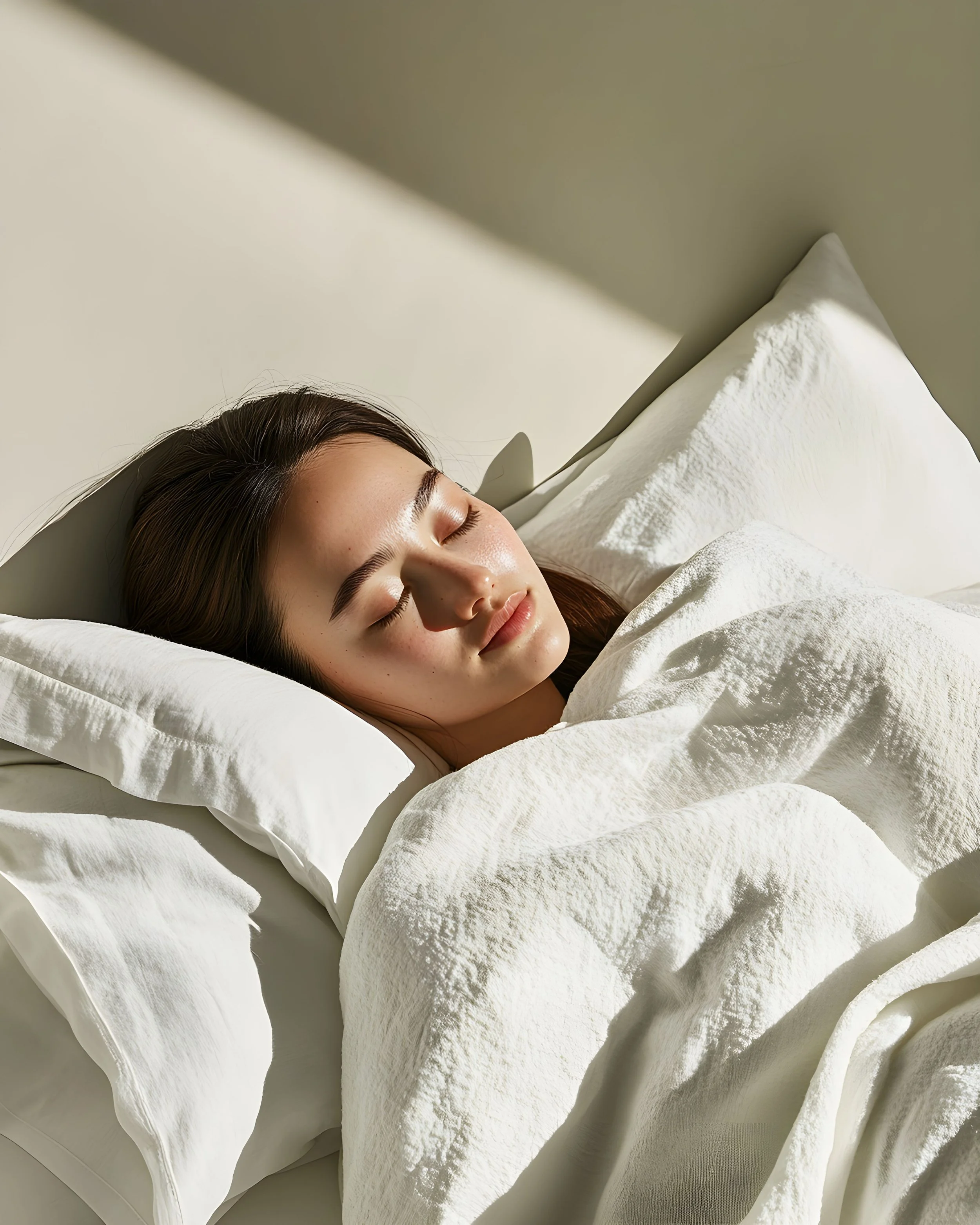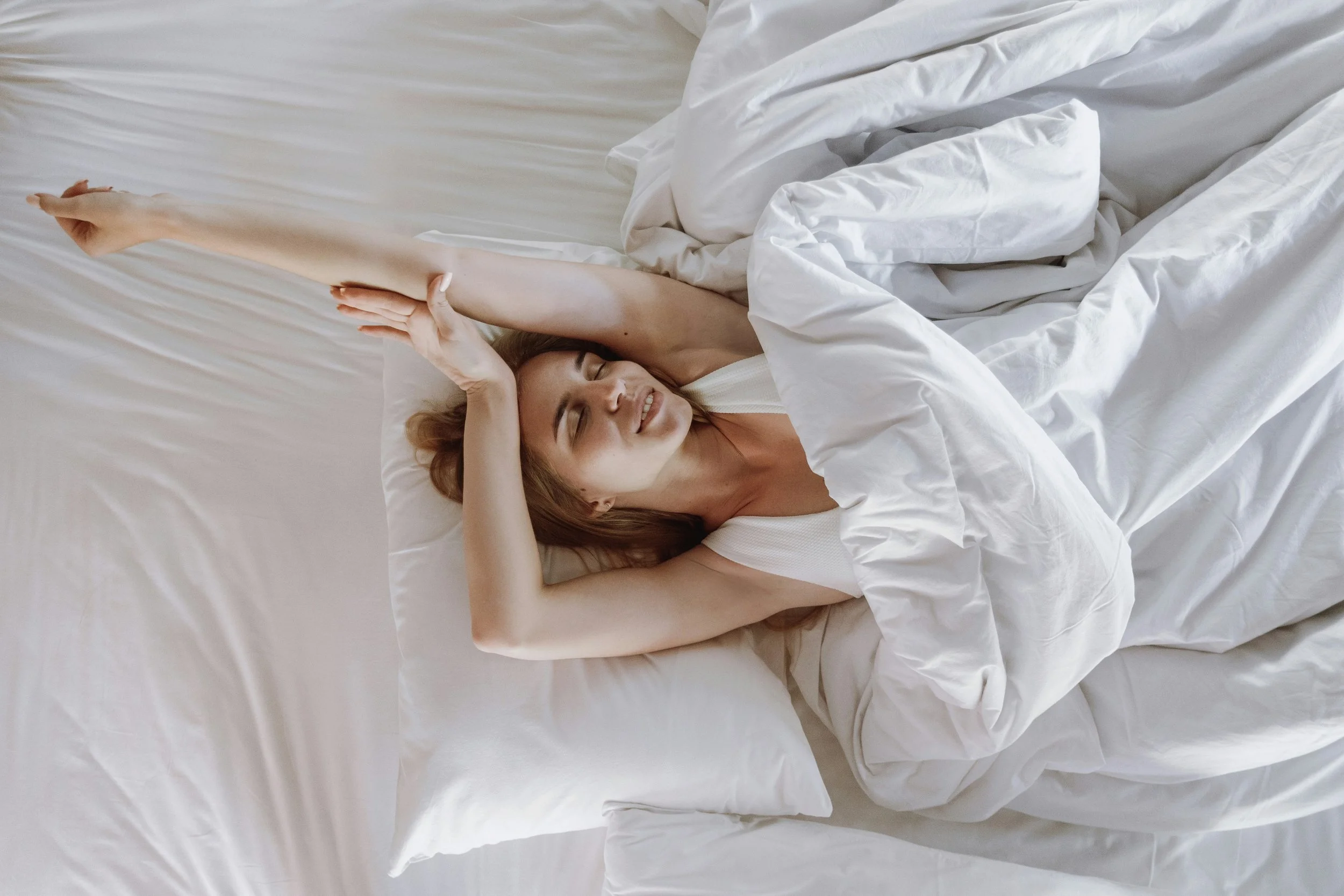Sleep Hygiene
Simple Shifts To Transform Your Health
We live in a world that's constantly "on." Stress, late-night screen time, poor dietary habits, and environmental toxins steal one of our most essential life forces: deep, restorative sleep.
Sleep is not a luxury — it's a biological necessity. It's the time your body repairs, your mind resets, and your spirit rejuvenates. Without it, we're not just tired but out of balance. If you want to thrive, heal, and truly enjoy your life, exceptional sleep is necessary.
Unfortunately, many people are unknowingly sabotaging their sleep. They wake up in a bad mood, feel "off," and cognitive function suffers--and they don't always realize that various odd symptoms are fueled by poor sleep. Snoring (self or partner) puts people at a heightened health risk. Let's unpack what might interfere with your rest and explore practical, holistic solutions that can transform your nights (and days).
The Hidden Reasons for Why You May Not Sleeping Well:
Tech and EMF Disruptions: WiFi signals, cell phones on nightstands, TVs in the bedroom, electric blankets, and even alarm clocks by your head — all contribute to electromagnetic frequency (EMF) exposure that interferes with your body's natural sleep rhythms.
Toxic Mattresses: Many mattresses (like memory foam brands) off-gas harmful chemicals. Combine that with hormone-disrupting ingredients in personal care products, household cleaners, non-organic bed sheets and pajamas, and synthetic bedding, and your body works overtime to detox — when it should be resting.
Poor Sleep Hygiene: Late-night emails, scrolling social media, and falling asleep to the TV all overstimulate your nervous system, making it harder to fall (and stay) asleep.
Diet, Alcohol, and Blood Sugar: What you eat and drink — especially late in the day — matters. Sugar, caffeine, and alcohol can wreak havoc on your sleep quality and disrupt natural circadian rhythms.
Sleep-Disruptive Medications: Check Your Medications. Some prescriptions — including certain antidepressants, blood pressure meds, or decongestants — can interfere with sleep. If you're struggling despite healthy habits, talk with your provider about whether your medications could be a factor.
Simple & Holistic Tips for Better Sleep:
Invest in Organic Bedding — Choose natural materials like organic cotton, linen, or silk — they're breathable, chemical-free, and healthier for your skin and lungs.
Wash Your Sheets Often — Clean bedding contributes to better respiratory health and skin. Aim for once a week, or more often if you sweat or don't shower before bed. Use non-toxic, fragrance-free laundry detergent.
Eliminate EMFs from Your Bedroom — Keep cell phones out of your room (or at least on airplane mode and a minimum of 5 feet from your bed), unplug nearby electronics, and avoid having outlets or power strips near your headboard. Ditch the electric blanket — opt for layers instead.
Create a Wind-Down Routine — For at least 45 minutes before bed, feed your mind with only positive input — soothing music, inspiring reading, uplifting conversations, prayer, or meditation. The energy you fall asleep with is the energy that your subconscious carries all night long.
Ditch Blue Light at Night — Avoid screens (TV, phone, computer) 1–2 hours before bed. Blue light suppresses melatonin production — your body's natural sleep hormone. If you must, wear blue light-blocking glasses.
Darken Your Room — Use blackout curtains or a silk eye mask to block out all light. Even the tiniest LED or streetlight glow can signal your brain to stay alert.
Dial in the Temperature — Keep your room cool. 64–67ºF is ideal for most people. A cooler environment helps your body relax and stay asleep. The body naturally drops in temperature when you sleep, which is necessary to detox and restore your body properly.
Support Relaxation with Supplements — Talk to your doctor about incorporating calming aids like magnesium (great for relaxing muscles) or high-quality CBD oil or melatonin.
Breathe Easy with Clean Air — Use a HEPA air purifier in your bedroom. Cleaner air means better oxygen flow and fewer allergens disrupting your sleep.
Consistent Sleep & Wake Times — Stick to a Sleep Schedule. Your body thrives on rhythm. Try to go to bed and wake up at the same time every day — even on weekends — to regulate your internal clock and support deeper, more consistent sleep.
Movement During the Day — Move Your Body. Physical activity during the day (especially morning or early afternoon) helps you fall asleep faster and sleep more soundly. Just avoid intense exercise too close to bedtime, as it may be overstimulating.
Mind Dump or Gratitude Practice — Journal Before Bed. A short journal session before sleep — especially one that focuses on gratitude or clearing your mind of racing thoughts — can reduce anxiety and help you fall asleep with a peaceful heart.
Avoid Heavy Meals Late at Night — Watch What (and When) You Eat. Try to eat dinner at least 2–3 hours before bed. Heavy or spicy meals can cause indigestion and make it harder for your body to shift into rest mode. REM is disrupted with blood sugar crashes (thanks to alcohol, carbs, and sugar in the evenings).
Limit Fluids Before Bed — Reduce Nighttime Wake-Ups. Drinking too much water or tea too close to bedtime can cause middle-of-the-night bathroom trips. Hydrate well during the day and taper fluids in the evening.
Fix Snoring — Chronic snoring may be a sign of sleep apnea, which increases cardiovascular risk and should be evaluated by a healthcare provider. This is a major sleep disturbance, not just for the person with sleep apnea but for the partner who has to listen to it.
Morning Light Exposure — A powerful circadian rhythm regulator that’s often overlooked: Morning Light Matters. Get natural light exposure within 30–60 minutes of waking. Sunlight in the morning signals your brain that it’s time to be alert, helping to reset your sleep-wake cycle and improve nighttime melatonin production.
Use Essential Oils — Diffuse calming scents like lavender, rose, or vanilla to shift your nervous system into a parasympathetic ("rest and restore") state.
Sleep Naked — Sleeping in the nude isn’t just freeing — it’s healing. It allows your body to regulate temperature more efficiently, which supports deeper, more restorative sleep. It also improves blood circulation, reduces cortisol (your stress hormone), and allows your skin to breathe and detox naturally overnight. Bonus? Skin-to-skin contact with a partner can boost oxytocin — the feel-good hormone that helps you feel safe, relaxed, and deeply connected. Ditch the pajamas and let your body rest the way nature intended.
Closing Thought:
You don't have to overhaul your entire life to start sleeping better. Just a few intentional changes can make a world of difference. Start with one or two shifts that feel doable, and build from there. Sleep isn't selfish — it's sacred. The more you honor your body's need for rest, the more you'll wake up ready to live the vibrant life you were made for.
Sweet dreams, and here's to waking up refreshed and restored.







Lean In, Have Courage — Discover the transformative power of "leaning in," taking action in the face of fear, and finding your voice in this inspiring journey of personal growth from America's Health Coach, Jennifer Price.